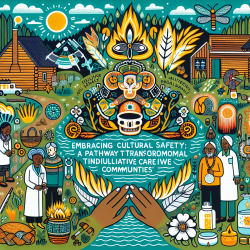Introduction
In the realm of healthcare, particularly palliative care, cultural safety has emerged as a vital concept for ensuring that services are not only accessible but also respectful and empowering for Indigenous communities. The research article "Cultural safety strategies for rural Indigenous palliative care: a scoping review" provides insightful strategies that practitioners can implement to enhance their skills and improve the quality of care for rural Indigenous populations. This blog explores these strategies and encourages practitioners to delve deeper into the subject for a more profound understanding and application.
The Importance of Cultural Safety
Cultural safety goes beyond cultural competence, which often focuses on understanding and accommodating cultural differences. It requires a critical reflection on power dynamics, colonial histories, and systemic biases that affect healthcare delivery. By adopting culturally safe practices, healthcare providers can foster environments where Indigenous patients feel respected and valued, leading to better health outcomes and enhanced trust in healthcare systems.
Key Strategies for Implementing Cultural Safety
- Symbolic and Small Gestures: Simple actions, such as displaying Indigenous art or celebrating National Aboriginal Day, can create a welcoming atmosphere for Indigenous patients.
- Anticipating Barriers to Care: Healthcare providers should be proactive in identifying and mitigating barriers that Indigenous patients may face, such as language barriers or lack of culturally appropriate consent processes.
- Defer to Client, Family, and Community: It is crucial to honor the preferences and traditions of Indigenous patients, which may include specific rituals or the involvement of family and community in care decisions.
- Shared Decision-Making: Engaging patients and their families in decision-making processes ensures that care plans align with their cultural values and needs.
- Community Ownership of Services: Encouraging community involvement in the planning and delivery of services can enhance the relevance and acceptance of palliative care programs.
Moving Towards Decolonized Care
Implementing culturally safe strategies is a step towards decolonizing healthcare. This involves recognizing the impact of colonialism and racism on Indigenous health and committing to power-sharing and partnership-building in care delivery. By doing so, healthcare providers can contribute to systemic change and support Indigenous self-determination.
Encouraging Further Research and Reflection
While this blog highlights key strategies from the research, it is essential for practitioners to engage in continuous learning and reflection. Attending conferences, reading publications, and participating in webinars can provide further insights into culturally safe practices. Networking with other professionals and Indigenous communities can also foster a deeper understanding and collaboration.
To read the original research paper, please follow this link: Cultural safety strategies for rural Indigenous palliative care: a scoping review.










